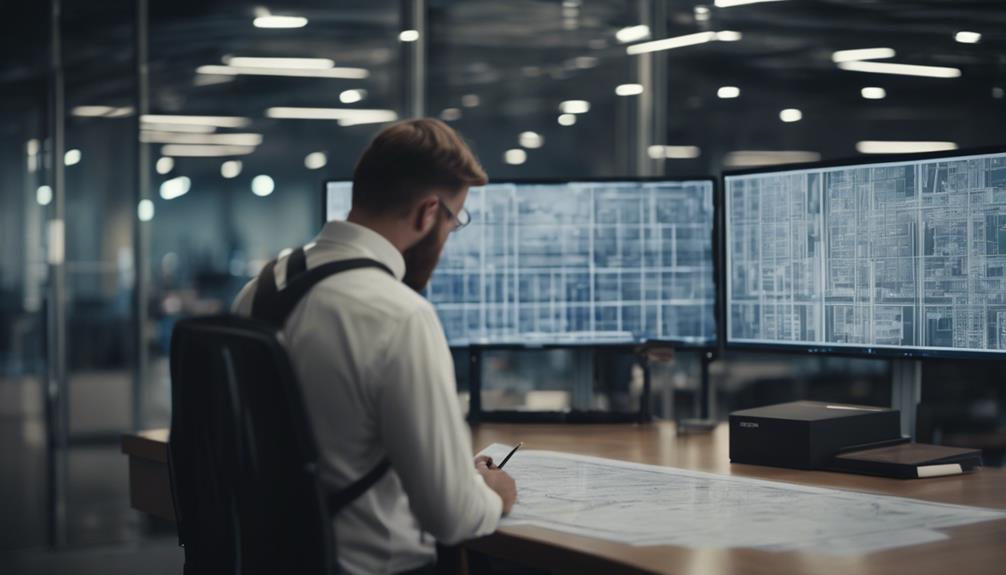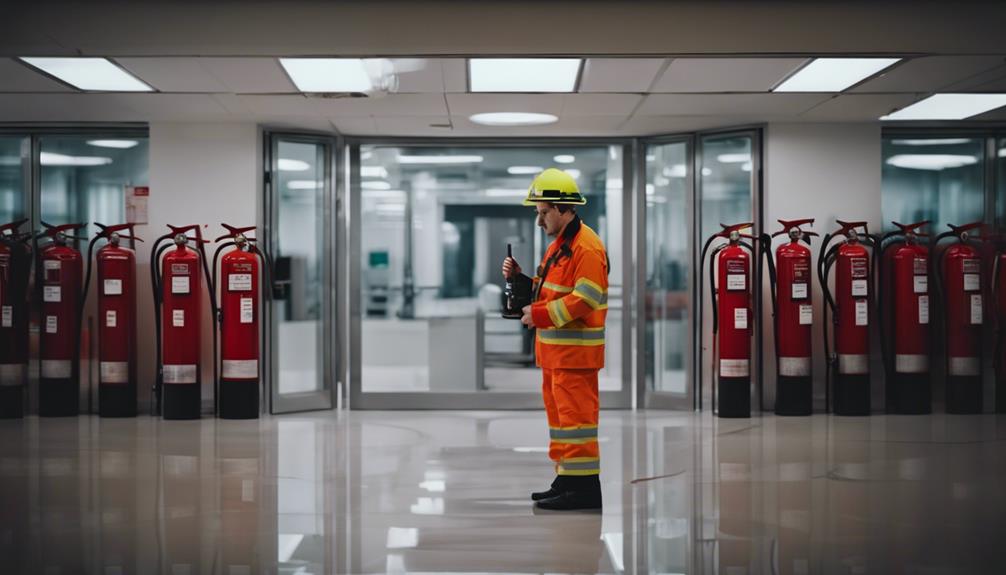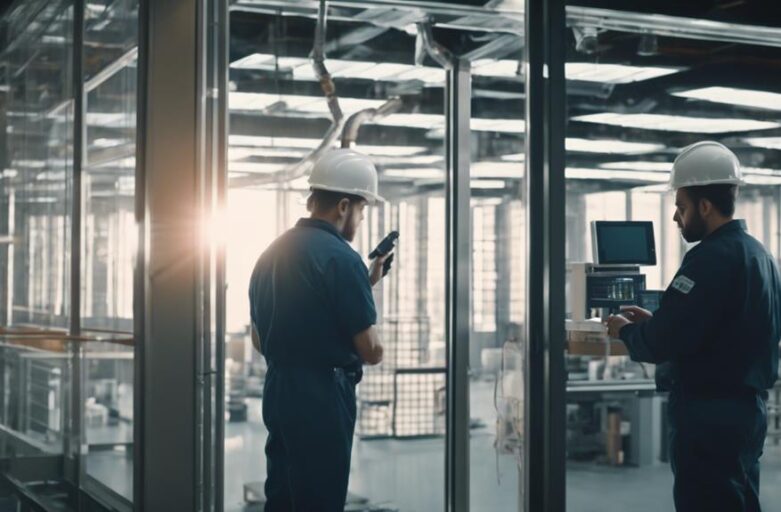There are five main rules you need to remember when it comes to checking commercial buildings.
First, learn about your local building rules.
Next, there are national rules from OSHA and ADA that you should follow.
Third, don't forget about your state and city's own rules.
Rule number four is to keep a good record of everything you check.
The last rule is to regularly check safety equipment.
Each rule helps to make commercial buildings safer and better. The more you learn about these rules, the better you can inspect your commercial building.
Key Takeaways
- Following rules set by OSHA to keep everyone safe in commercial buildings.
- Making sure buildings meet ADA standards so people with disabilities can access them.
- Paying attention to EPA rules to protect the environment when running commercial buildings.
- Sticking to the building codes of the state and city to ensure safety and follow rules.
- Checking safety tools and systems often, like fire alarms and emergency systems.
Understanding Local Building Codes
Let's dive into the world of local building codes, which are super important when you're checking a commercial property. These codes are rules from various groups like OSHA, EPA, ADA, and state, county, and city officials. They can feel like a maze you have to get through, especially if you own or manage a property. Your task is to make sure your property follows all these rules.
Think of your commercial building like a big creature that needs constant care. Like any creature, it has its own set of rules to live by. That's what local building codes are – they're like your property's rulebook. They tell you things like how many people can be in the building, how to keep it safe, how to make it accessible for everyone, and when you need permits to fix or change things.
Following these codes isn't just a good idea, it's super important. They're like a guide for a successful property check. They also show that you're committed to keeping your property safe and easy to use for everyone. They tell your community that you're a good neighbor.
Not knowing about building codes isn't a good thing. It's important to understand them, respect them, and follow them. Doing this not only protects your property, but also helps you fit in better with your community.
Federal Regulations Compliance
Let's talk about the big rules for checking if a commercial building is up to par. These rules come from three main groups: OSHA, EPA, and ADA. These checks aren't just for show, they make sure that the building is safe, easy to get around for everyone, and kind to nature.
The rules from OSHA are all about safety at work. They want to keep workers safe from anything bad that might happen. These rules are super important and make sure that your commercial building is a safe place for all.
On the other hand, the ADA rules are about making sure everyone can use the building, even if they've disabilities. It's not just about following the rules, it's about making sure that everyone feels included.
Then we've the EPA. They're like the protectors of nature, making rules to ensure that your commercial building doesn't harm the environment. This is a key part of checking a commercial building and reminds us that we've to look after our planet.
Knowing and following these big rules isn't just something we've to do—it's about keeping people safe, making sure everyone is included, and taking care of the environment. And remember, it's not a tough task but a step towards making commercial spaces safer, more welcoming, and better for nature.
State and City Code Adherence

Just like you follow national rules, it's really important to know and stick to state and city codes when you inspect commercial buildings. This helps you keep everything safe and avoid problems. Inspecting commercial properties might seem hard, but it's very important. You play a big role in keeping people safe and making sure buildings last a long time.
Understanding and following building codes is a big part of your job as inspectors. You're not just ticking off a list; you're keeping people and their investments safe. If you break these codes, you might've to pay fines, deal with delays, or even face legal problems. But it's not just about avoiding trouble; it's about making sure everyone can trust in the rules.
Every time you inspect a building, you're showing how much you care about safety and quality. Your attention to detail makes sure that commercial properties meet the rules set out by the state and city. You're not just inspectors, you're in charge of making sure everyone follows the rules and stays safe. Remember, following rules isn't something you can choose to do or not do; it's really important. So, keep learning, stay excited about your work, and most importantly, always follow the rules.
Record-Keeping and Documentation
Diving into the world of keeping records and paperwork, it's really important to know that this is the base for any successful check of a commercial building. Having a neat, full report of permits, check reports, and upkeep records isn't only needed but shows your dedication to safety and following the rules.
Creating a clear and open environment in building checks, you should keep a careful record of guarantees, work orders, and bills. This makes it easier to keep up with maintenance and fix things, but also helps build trust with your Real Estate community. Don't forget, your records show your dedication to following the rules and keeping buildings safe.
Use digital systems to quickly and easily get to important documents. This makes the check process smoother and also makes sure you're ready for any disagreements. Detailed paperwork is your protection, showing that you've followed the right steps and used the right materials.
Safety Equipment and System Checks

Safety stuff and system checks in big buildings are super important. This keeps everyone safe. It's good to know about the people who check these things, called building inspectors.
Building inspectors make sure everything is working like it should. They look after fire alarms, sprinklers, and emergency systems. They make sure everything is ready if something bad happens.
Here's a simple list of some of the safety things they check:
| Safety Thing | What They Do |
|---|---|
| Fire Alarms | Test often to make sure they work |
| Sprinklers | Look at them to make sure they're cared for |
| Emergency Systems | Make sure they're ready to use |
| Exit Signs | Check if backup lights work |
Conclusion
So, your building is all set and functioning. But it's crucial to remember that knowing your local rules, sticking to national laws, abiding by state and city regulations, keeping clear records, and often checking safety tools aren't just important – they're key to your business doing well.
These tasks may seem a lot, but try not to be daunted by them. Instead, welcome them. After all, a building that's checked thoroughly is a safer, better working, and more money-making one.
It's in your hands, so make it top of your list.


